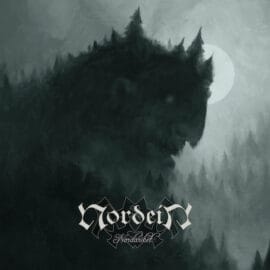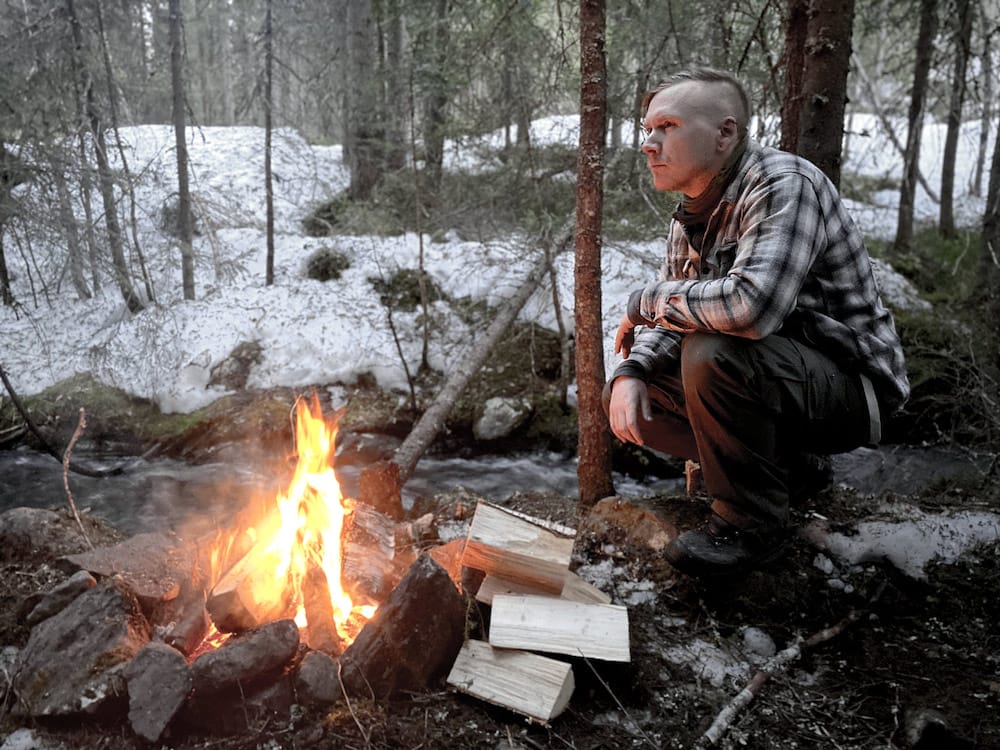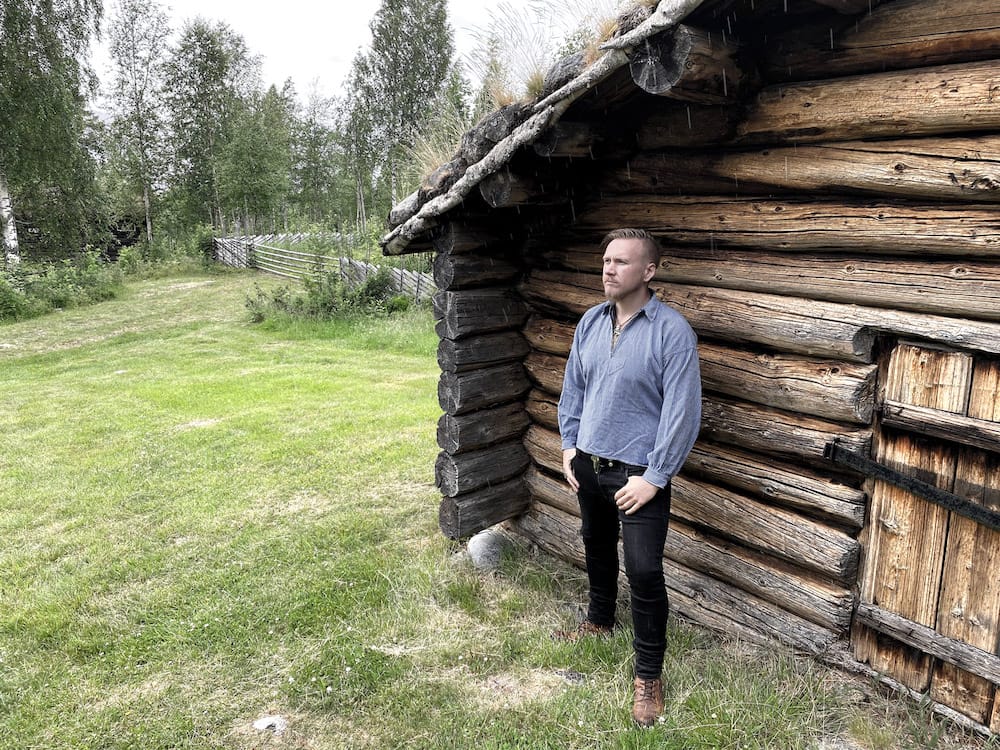With NORDEIN, Jørn Øyhus alias Nord, who may be known to some black metal fans from bands like Nordjevel and the newcomers Varde, has founded an interesting folk solo project which recently released a more than solid debut titled „Nordariket“ that is worth paying attention to. In the following interview, the Norwegian solo artist explains more about his love for traditional folk songs, which he discovered at a young age, what the composer Edvard Grieg had to do with it and why it is not easy these days to fulfill the expectations placed on metal musicians.

Music fans probably know you mainly from black metal bands like Varde and Nordjevel. What inspired you to turn to playing folk with NORDEIN now?
I’ve been playing and listening to all sorts of music, including folk style music, long before my metal years. The folk side of things has intrigued me ever since I was a little kid. I’m not sure exactly why I was drawn to folklore, myths and olden times, but here we are, I guess!
When did you originally develop an interest in folk music?
I would have to thank my primary school music teacher Håvard for that. We sang traditional folk songs such as ‘Mellom Bakkar Og Berg’, ‘Kråkevisa’ and ‘Håvard Hedde’. These traditional melodies fascinated me, as they were kind of moody compared to the music I was exposed to on a daily basis. I could in a way feel the connection between the melodies and my natural surroundings here in Norway. That was very eye opening for a young kid. Of course Edvard Grieg’s ‘Peer Gynt suite’ played an important part in my early developing interest in this kind of music.
How easy or difficult was it for you to switch from black metal to folk as a musician?
It wasn’t a transition from one to the other as much as it was a natural progression. I have never considered myself a musician of any particular genre really. I have always been interested in music in general, and I enjoy playing all sorts of instruments. Extreme metal is a genre in constant development with an ever growing focus on technique and surgical finesse. I don’t have the skills and talent required to be a proficient metal musician in 2020.
 You recently released not only NORDEIN’s debut album „Nordariket“, but also the first full-length of your black metal band Varde, „Fedraminne“. Were the two albums made simultaneously?
You recently released not only NORDEIN’s debut album „Nordariket“, but also the first full-length of your black metal band Varde, „Fedraminne“. Were the two albums made simultaneously?
I worked on both albums during the same time period, of course, with proper dedication to both. I enjoy having several projects going at the same time, and I have learned how to balance these things. What I’m working on from day to day depends on my mood, and, of course, if there are any deadlines on the horizon. I try to always stay one step ahead though, as I prefer keeping my stress levels as low as possible.
Currently many bands are struggling with the situation due to the corona pandemic, some have also postponed the release dates of their albums. Why did you decide to release two records right now?
We never really considered postponing either one of the releases. I understand that big artists have to schedule their releases according to touring etcetera, but that doesn’t apply to what we are doing at the moment. “Nordariket” and “Fedraminne” came out exactly one week apart, and I had nothing to do with that. The respective labels set the release dates completely independent of each other, and I thought it was a good thing. I think releasing two albums in one week could possibly be a once-in-a-lifetime experience.
The two albums have been released through two different labels. Wouldn’t it have been easier to leave that to a single record company?
In some ways it would probably have been easier, but we were never interested in a “package deal”. Since the two bands are so different, it’s only natural that they are signed to different labels. The relationship between band and label is very personal in a way. I think mixing the roles too much would lead to more complications than advantages, kind of like having dinner with your wife and your mistress at the same time.
The description of „Nordariket“ says that you want to play folk less kitschy than many black metal musicians did in the early days of the genre. To which bands or albums does this refer?
That quote was taken from a third party statement about NORDEIN and “Nordariket”. I had nothing to do with it in that sense, and I don’t know which bands the author had in mind. Maybe I have those very artists and albums on my shelf, who knows? As I have grown older I try not to judge or condemn what other artists do. If I like something, I fully embrace it. If I don’t like something, I try to walk away without making a scene about it.
Which works of folk black metal do you find well-made on the other hand?
The first era of Satyricon is a good one in that regard. Also the early works of Andreas Hedlund aka Vintersorg are also among my favourites in the genre. Isengard, of course, is another gem within this style.
You also called your own style „mountain music“. What is the connection between your music and the mountains that might set it apart from music coming from lowlands?
I live in the lowlands myself, with a relatively short drive up to the mountains. To me ‘mountain music’ is more about the musical connotations than the physical landscape itself. NORDEIN was born in the mountains, and the music reflects my inner world when I’m at total peace. I love the ocean and the forest too, but the soul and the sheer might of the mountains really resonate with something in me. The mountains are ruthless, relentless and at the same time so heartbreakingly beautiful and timeless. To me they are the closest natural representation of immortality and eternity I can imagine. That is something I try to capture with my music, so I have basically set up a lifelong Sisyphos scenario for myself.

Unlike some folk albums, which are completely recorded on an acoustic guitar, „Nordariket“ has a quite rich instrumentation. Which instruments do you use on the record?
The main elements on the album are vocals and choir arrangements, flutes, nyckelharpa (keyed fiddle), drums/percussion and a wide range of stringed instruments. I also managed to sneak in some bassoon and soprano saxophone. You will also hear some keys in tracks like “Máni” and “Norner”. Another thing is that I like experimenting with instruments to make them sound like other instruments. You got to work with what you have!
Did you record all the instruments yourself or were other musicians also involved in the making of the album?
My brother helped out with the bassoon stems, as I’m not very skilled with reed instruments. Also my good friend Mathias Gyllengahm plays nyckelharpa, and my significant other did the female vocal parts heard in “Alvedans”. I fiddled together the rest of the musical parts myself.
What is the lyrical content of „Nordariket“ about? Do you set folk tales or stories and themes of your own making to music?
I wrote my own lyrics, except for “Klok Og Tagal” which has words taken from “Håvamål”. The lyrical content revolves around the relationship between man and the divine. The contrasts may seem huge, but at the same time there’s a very obvious symbiosis between all things. The divine connection is always there, from highly aesthetic and symbolic rituals to the raw reality of human survival.
As a bonus track there is also a cover of the Nordjevel song „Norges Sorte Himmel“ on the album. Why did you want to turn this song in particular into a folk song?
That is something I’ve had in the back of my mind ever since I wrote the song back in 2015. For a ‘black metal’ track it has a very musical and melodic character. Most people probably wouldn’t even call it black metal. I hadn’t really considered recording it under the NORDEIN banner until Mathias Gyllengahm suggested it. I thought it was a brilliant idea, and I’m happy we did it.
What is the most important thing to you when it comes to song covers? Do you prefer new versions that are close to the original or ones that are a bit more experimental?
It depends on the individual song. Some old classics are fun to hear in their original form with an upgraded production. Other times it’s interesting to hear completely new and original interpretations. If I had to pick one I’d say I enjoy hearing covers close to the original, but with the new artists distinct signature.

Do you plan to perform live with NORDEIN once it will be possible again?
There are no concrete plans at the time, but I’ve been discussing the idea with the label. I need to pinpoint how many musicians are needed to properly represent the music live. Musicians able to switch between instruments would be preferable because of the varied orchestration between songs. The same goes for me, of course, as I don’t see myself sticking to just one function on stage. With the right crew onboard, I’m hopeful we will be able to properly present it live.
What else do you have planned for NORDEIN? Do you intend to continue the project in the long run?
I can reveal that the second album is already written, and I’m currently working on recording it. Inspiration hit me last summer when we suddenly got a few weeks of really cold and gloomy weather. The bad weather wasn’t the inspiration, but going from being busy outside in the sun to being stuck inside made my mind wander to a very strange place. NORDEIN isn’t a short term idea, and my plan is to release many albums in the years to come. My mind is always full of musical ideas and concepts that I will need to realise at some point.
Let’s go through a short brainstorming session at the end. What comes to your mind with the following terms?
Myrkur’s „Folkesange“: I must have missed that one, but I know the band has been very successful.
Everyday life: Create a life you don’t have to keep running away from. Everyday life is wonderful if you follow your true path.
Electronic music: It’s just another way of making music. If it sounds good it’s good music in my book. I know it eliminates tuning issues, which must make studio sessions heavenly!
Spirituality: The soul needs nourishment and frequent exercise to stay in shape, just like the mind and body. I might be wrong, but I get the feeling that certain parts of modern society are stuck in a void. Spirituality has on many levels been replaced by worshipping material possessions, ego and celebrity figures. Is that what’s being called progress and development?
Neofolk: I’ve seen this concept blowing up in popular culture during the past few years. I’m not sure if it only relates to music, or to the entire renaissance of certain historical eras. Anyway, if something good comes from it, I’m all for it.
Solitude: Solitude is a good friend of mine, but it demands respect. Knowing and being comfortable with solitude can be a very good thing, but too much of it will eat your mind. I’ve been on both sides of that, and finding the right balance takes time and work.
Now we have reached the end of our interview. Would you like to say a few last words to the readers?
I’m very grateful for the interest people take in my music. NORDEIN is a very personal and, in some ways, painful journey for me. Every single person that wants to come along leaves me a bit more humbled. Lastly, if you are worried about the dramatic changes going on in society, remind yourself that the real world never changed.
Dieses Interview wurde per E-Mail geführt.
Zur besseren Lesbarkeit wurden Smilies ersetzt.
